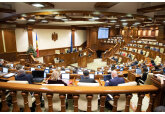
Moldova is not ready for the practical implementation of the new Customs Code from January 1, 2024: there is no regulatory framework and preparation of all procedures is not ensured.
The European Business Association (EBA) expressed this opinion in a letter sent to the Moldovan authorities. The organization believes that the Customs Code is an innovative and complex document, so its implementation requires significant effort and specification of many aspects that are unlikely to be resolved by the end of 2023. For example, there is no secondary regulatory framework for the implementation of the code; accordingly, it is unrealistic to introduce a new Customs Code from January 1, 2024. Before the new Customs Code comes into force, it is necessary to develop and adopt a comprehensive set of by-laws, approve, implement and test an electronic system that will ensure the functioning of the regulatory framework. It is also necessary to ensure awareness and understanding of the regulatory framework and technological component, both by officials of executive authorities and economic agents. None of these processes are at the stage of completion. None of the draft regulations, instructions and forms of documents developed by the Customs Service for the implementation of the Customs Code has been approved. And some provisions, for example, the executive regulation on the introduction of the Customs Code, which was published in March 2023, cannot be considered prepared for implementation, since it contains many completely or partially erroneous references to its own rules. Due to the novelty, significant volume, material and procedural coverage of customs rules to be applied from January 1, 2024, their implementation without taking into account the degree of their completeness and finality, as well as the ability of subjects to apply them, is unjustified. The letter draws particular attention to changes in customs regimes for residents of free economic zones and the Giurgiulesti port, which will require significant changes in operating models. There are ambiguities regarding the regime of active processing, unreasonableness in the application of a customs guarantee when placing goods in the free zone regime, there are no transitional rules for establishing the status of fixed assets of goods available in the FEZ and Giurgiulesti port. There is no clarity regarding the impact of the new Labor Code on import tax collections, etc. // 12.12.2023 — InfoMarket.







